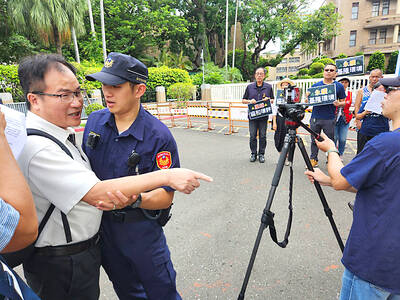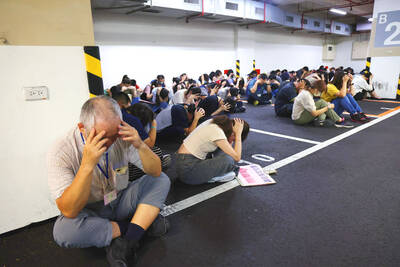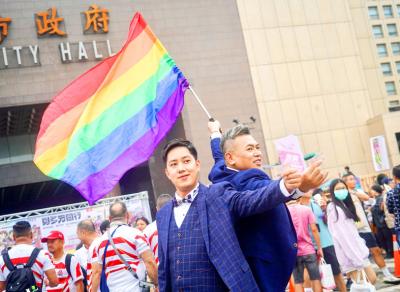Businessman Wang Rong-sheng, 61, recently returned to Taiwan on a break from his company in Shandong Province, China, and accompanied his 85-year-old mother on a visit to the Tainan City neighborhood that was their home for decades.
It was a wrenching experience because their old village of Shueijiaoshe (水交社), a 45-hectare residential compound for air force personnel and their dependents since 1948, has been razed.
Wang’s father, an air force officer, and his family settled there in 1950. Memories of his family’s Japanese-style home, the air raid shelter where he played hide-and-seek with his friends, and the stand where his mother would buy steamed buns for breakfast from a veteran from Henan Province all welled up as Wang was overcome with emotion.
Wang’s wife of 35 years could appreciate how her husband and his mother felt after seeing their home of nearly five decades turned into piles of debris as she also grew up in a village for military dependents, known in Taiwan as juan cun (眷村), that no longer exists.
Nostalgia is all many former residents of these juan cun have left as the villages fade into oblivion with the veterans passing away and the single-story dwellings, many from the Japanese colonial era, being torn down to make way for urban development projects.
Roughly 600,000 military personnel and their dependents from China settled in the juan cun — mostly quickly erected shanty villages — and the compounds were like miniature versions of China, with people from different provinces living next door to each other.
By 1982, fewer than 100,000 units in about 300 full-scale compounds were left nationwide. All that remains today are some 1,300 units on sites scattered around Taiwan, their obstinate residents holding out against having their houses torn down.
The Wangs moved out of Shueijiaoshe in the late 1990s in pursuit of modern comforts and new opportunities, but, as with many former juan cun residents, their village still exists in their memories, and some former residents are pushing to preserve their culture in more than just their minds.
Yu Lih-hua (喻麗華), a professor at National University of Tainan who was raised in Shueijiaoshe, and a group of Shueijiaoshe activists have scrambled to save parts of the village since Tainan City began dismantling the compound in 2007.
“We Shueijiaoshe people have lagged behind our counterparts in other juan cun around the country in conservation,” Yu said.
As Shueijiaoshe grew obsolete during this decade, the Tainan City Government quickly moved to reclaim the site and earmarked some NT$200 million (US$6.2 million) to clean up the village, build new roads and manage the land in a bid to turn it into an upscale residential area with a shopping mall.
But through the efforts of Yu and others to keep Shueijiaoshe’s memory alive, the city government left eight Japanese-style residences, the village’s elementary school and a number of old trees. The old residences will become museums and an ecological park will highlight the site’s century-old elm trees, decades-old mahogany trees and giant coconut trees.
A total of 23 juan cun have been preserved in similar ways around the country, and Yu says Shueijiaoshe could be selected by the Ministry of Defense as one of the up to 10 locations that will be developed into juan cun cultural preservation areas aimed at conserving the unique culture of these villages.
The ministry’s Military Dependents’ Service Department has asked local governments that want to participate in the NT$400 million project to submit their plans by March.
When Wang and his mother were touring their old village, they were guided by Chu Rong-mei (朱戎梅), who was also raised in Shueijiaoshe and now teaches Japanese at National Cheng Kung University in Tainan. She also wrote a book called Shueijiaoshe — A Juan cun in Memory that was published last December.
She said she forced herself to complete the book in two months, before an Asahi Shimbun crew visited Shueijiaoshe as part of an in-depth report on Taiwan’s juan cun and their culture.
“We could not let the Japanese outperform us in the effort to preserve our own unique but fading juan cun culture,” Chu said.
During the Wangs’ tour, Chu took them to an open field where several Japanese residences were located before they were leveled in 2007. The houses had built for Japanese naval officers and their dependents, but it turned out the area was home to even older relics.
Scores of old tombs were discovered there, some dating back to the Ming and Qing dynasties. The gravestones and wooden coffins with thick earthen and gravel shells, were unearthed in April as workers cleared the land for a new road.
Turning to another area of the now empty village, Chu identified a place where the homes of the first-generation pilots of the famous “Thunder Tiger” jet fighter squad were located.
The “Thunder Tiger” squad was a source of pride for Taiwan during the 1950s and 1960s and some squad members were national heroes for downing Chinese MiG-15 and MiG-17 fighters. The squad’s exceptional flying skills were also shown off at National Day parades and overseas shows between 1952 and 1989.
This “Thunder Tiger” squad was just one element that made village unique, Yu said. The name of Tainan Air Force Elementary School, attended by almost all the children in Shueijiaoshe before the 1970s, was changed to Tainan Municipal Chihkai Elementary School in 1967 in memory of air force hero Chou Chih-kai (周志開).
Chou was awarded medals by late dictator Chiang Kai-shek (蔣介石) in the early 1940s for downing six Japanese fighters before he was killed in an battle over Hubei Province in 1943.
Those who grew up in Shuei-jiaoshe all remember an open stadium where many movie stars from Taiwan and Hong Kong, even the US, visited to meet fans and cheer up the military troops.
But perhaps as enduring as any memory are the basic tastes and smells derived from the variety of food representing all corners of China that appeared in the village.
Through the efforts of Yu, Chu, and many other activists, those memories will now survive.

Environmental groups yesterday filed an appeal with the Executive Yuan, seeking to revoke the environmental impact assessment (EIA) conditionally approved in February for the Hsieh-ho Power Plant’s planned fourth liquefied natural gas (LNG) receiving station off the coast of Keelung. The appeal was filed jointly by the Protect Waimushan Seashore Action Group, the Wild at Heart Legal Defense Association and the Keelung City Taiwan Head Cultural Association, which together held a news conference outside the Executive Yuan in Taipei. Explaining the reasons for the appeal, Wang Hsing-chih (王醒之) of the Protect Waimushan Seashore Action Group said that the EIA failed to address

Taipei on Thursday held urban resilience air raid drills, with residents in one of the exercises’ three “key verification zones” reporting little to no difference compared with previous years, despite government pledges of stricter enforcement. Formerly known as the Wanan exercise, the air raid drills, which concluded yesterday, are now part of the “Urban Resilience Exercise,” which also incorporates the Minan disaster prevention and rescue exercise. In Taipei, the designated key verification zones — where the government said more stringent measures would be enforced — were Songshan (松山), Zhongshan (中山) and Zhongzheng (中正) districts. Air raid sirens sounded at 1:30pm, signaling the

The number of people who reported a same-sex spouse on their income tax increased 1.5-fold from 2020 to 2023, while the overall proportion of taxpayers reporting a spouse decreased by 4.4 percent from 2014 to 2023, Ministry of Finance data showed yesterday. The number of people reporting a spouse on their income tax trended upward from 2014 to 2019, the Department of Statistics said. However, the number decreased in 2020 and 2021, likely due to a drop in marriages during the COVID-19 pandemic and the income of some households falling below the taxable threshold, it said. The number of spousal tax filings rebounded

A saleswoman, surnamed Chen (陳), earlier this month was handed an 18-month prison term for embezzling more than 2,000 pairs of shoes while working at a department store in Tainan. The Tainan District Court convicted Chen of embezzlement in a ruling on July 7, sentencing her to prison for illegally profiting NT$7.32 million (US$248,929) at the expense of her employer. Chen was also given the opportunity to reach a financial settlement, but she declined. Chen was responsible for the sales counter of Nike shoes at Tainan’s Shinkong Mitsukoshi Zhongshan branch, where she had been employed since October 2019. She had previously worked